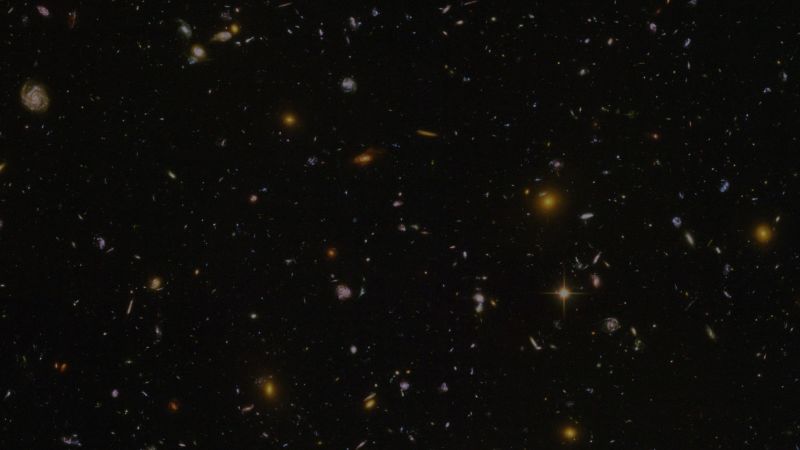Astronomers have spotted the oldest “dead” galaxy ever observed while studying the cosmos with the James Webb Space Telescope, and it’s one of the deepest views into the distant universe made with the observatory to date.
The galaxy existed when the universe was only about 700 million years into its current age of about 13.8 billion years. But something made the galaxy suddenly halt star formation almost as quickly as star birth had begun more than 13 billion years ago, and the researchers have yet to uncover the cause.
A report describing the discovery appeared Wednesday in the journal Nature. Studying the galaxy could reveal new insights about the early universe and the factors that affect star formation within galaxies, according to the authors.
“The first few hundred million years of the universe was a very active phase, with lots of gas clouds collapsing to form new stars,” said lead study author Tobias Looser, doctoral student in extragalactic astrophysics at the University of Cambridge’s Kavli Institute for Cosmology, in a statement. “Galaxies need a rich supply of gas to form new stars, and the early universe was like an all-you-can-eat buffet.”
The research team was surprised to find a so-called dead galaxy that essentially lived fast and died young so soon after the big bang that created the universe.
“It’s (usually) only later in the universe that we start to see galaxies stop forming stars, whether that’s due to a black hole or something else,” said study coauthor Dr. Francesco D’Eugenio, astrophysicist and postdoctoral research associate at the Kavli Institute for Cosmology, in a statement.
What causes galaxies to die
Star formation ceases when environmental factors starve a galaxy of the gas needed to seed the birth of new stars.
Supermassive black holes or the violent interactions of stars can be the culprits that eject gas from galaxies, bringing star formation to a quick halt. Or, the act of star birth can consume so much gas that there isn’t time for enough to be replenished to ensure the process will continue in the future.
“We’re not sure if any of those scenarios can explain what we’ve now seen with Webb,” said study coauthor Roberto Maiolino, professor of experimental astrophysics at the Cavendish Laboratory and the Kavli Institute for Cosmology at the University of Cambridge, in a statement.
“Until now, to understand the early universe, we’ve used models based on the modern universe. But now that we can see so much further back in time, and observe that the star formation was quenched so rapidly in this galaxy, models based on the modern universe may need to be revisited,” Maiolino added.
The Webb observations revealed that the newly discovered galaxy, named JADES-GS-z7-01-QU, experienced a short, energetic burst of star formation that lasted between 30 million and 90 million years before star birth suddenly stopped.
“Everything seems to happen faster and more dramatically in the early universe, and that might include galaxies moving from a star-forming phase to dormant or quenched,” Looser said.
An unusual observation
The dead galaxy revealed by the study is not the first astronomers have come across, but it is the oldest one observed thus far.
What’s more, the galaxy also had a low mass, similar to a dwarf galaxy near the Milky Way known as the Small Magellanic Cloud — which is still forming new stars. Previously observed dead galaxies have been much larger, adding another quirk to the Webb discovery.
The newly found galaxy is billions of light-years away from Earth, and a light-year is how far a beam of light travels in a year, or over 5.88 trillion miles (9.46 trillion kilometers). So Webb is essentially observing the galaxy as it existed in the past — and astronomers have not ruled out the possibility that it may have essentially resurrected and begun star formation anew.
“We’re looking for other galaxies like this one in the early universe, which will help us place some constraints on how and why galaxies stop forming new stars,” D’Eugenio said. “It could be the case that galaxies in the early universe ‘die’ and then burst back to life — we’ll need more observations to help us figure that out.”


